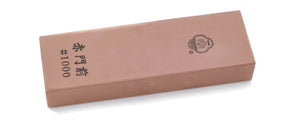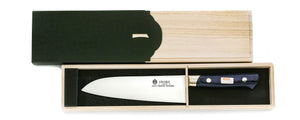Kitchen Knife Sharpening Frequency
How often should you sharpen a knife?
Should a knife be sharpened every day or once a week?
Can I sharpen my knife myself?
Is my roll sharpener enough?
We get questions like this in store every day with people purchasing their new knives. The frequency of sharpening strongly affects the lifespan of the knife. Based on your usage and other factors however, the answers to the above may change. This article will go into more detail about the frequency of sharpening and why that is so flexible, so you're not under or over sharpening your knife! Sharpening is something you can do at home with practice, patience and knowledge. Plus, it can be really fun and meditative! We'll also give some basic criteria if you're unsure how frequently you should sharpen as a springboard.
"Sharpness" is subjective
First and foremost, "sharpness" is something that can't visibly quantified; it relies on individual perception. One thing we've noticed in-store while sharpening knives is that people have completely different ideas of sharpness. What might be very sharp to someone, might not be so sharp to someone else.
The feeling of smoothly cutting through foods after finishing a sharpening versus hitting a bit of resistance and snagging while cutting due to some roughness at the edge—there's no precise answer as to what's the 'right' sharpness. Therefore, we believe the starting point is to establish your own criteria for the desired sharpness. The most important question to ask yourself is, how sharp is "sharp" to you?
It does sound philosophical, but it's important so that you can get your knife to the way you want it! Think of the standard that you want, and work towards it.
Why do the frequencies of sharpening change?
As said earlier, we often get asked, 'How often should I sharpen my knife?' while selling knives in our shopfront.
However, while our response changes from salesperson to salesperson, the answer tends to be a bit impersonal, normally stating, 'You need to decide that for yourself.' This is because there isn't a definitive answer that we can provide. Every situation is different - let's look into three factors that change how frequently you may need to sharpen:
The quality between knives can be very different
The lack of a set sharpening frequency is primarily due to the quality of the knife itself and the materials within. For example, let's compare our flagship 'FV10 Series', which is made using a uniquely heat-treated VG10 Stainless Steel, with a cheap knife sold at a hardware store for around 1000JPY/10USD as a baseline (note these exchange rates will flux, but for this example let's always consider it as ten dollars.) There's a large difference between the two, as you're going from a premium knife with special materials that prioritse strong edge retention to a non-specialist, cheaper knife that doesn't cost much to make in materials or labor.
While the hardware store knife's sharpness may only last a month, the FV10 Series has been reported to maintain its sharpness for over half a year, even with daily use. Therefore, you need to sharpen it significantly less frequently - over six times less, in this case!
What the knife is used for and how frequently it's used
This is also a significant factor, as the frequency of knife use varies from person to person—some people cook every day, while others only on weekends or even more sparingly. Additionally, the way people use knives differs, such as those who chop forcefully on a cutting board and those who use a wooden board more delicately determine sharpness loss. What kind of cutting board you use and how you cut on it is the leading factor of sharpness loss, so a more delicate usage on a wooden board will generally lead to sharpening being required less frequently.
The method of sharpening can vary
This is not as well known, but the way you sharpen a knife can also make a difference. The sustainability of sharpness can vary significantly between using a simple sharpener like a roll sharpener and meticulously sharpening with a whetstone, regardless of how good the knife itself is. Some styles of sharpening merely correct bent edges, whereas some shave rounded steel away, leaving a very sharp surface on the edge. Technique also matters here too. Even with going to a professional sharpener, whether they sharpen using an automatic machine or manually with a whetstone can cause differences in sharpness and edge retention.
Sharpening more frequently is recommended
We suggest sharpening knives frequently. As you continue to use a knife, the blade edge gradually rounds, and the sharpness decreases. Furthermore, the more the sharpness deteriorates, the more effort it takes to sharpen. Breaking that maintenance down over multiple smaller sessions over one long session can reduce hassle, and chances for error when sharpening.
The time it takes to sharpen a knife can more than double between a knife that has been regularly maintained with a reasonably sharp edge and one that is completely dull with a rounded blade.
If it doesn't feel the same to use, it's probably time to sharpen it and has been for a little while. Let's explore that a little more though, as this system doesn't always apply.
The sense of "sharpness" can fade over time
As mentioned earlier, the perception of "sharpness" is subjective and can't be really expressed with numbers. It feels different to everyone. However, precisely because of that, our tactile senses can be ambiguous. It's possible to gradually get used to to a decreasing level of sharpness without really noticing.
If you become satisfied with your knife's current sharpness, even if it's diminished, the frequency of sharpening the knife may decrease over time. As a result, you'll start having a knife that gradually becomes more blunt. Setting a schedule to sharpen is a good way to get around this.
At a base level, we recommend sharpening every one to two months.
It's also okay to hire a professional to sharpen your knives!
While frequent sharpening is ideal, the reality is that regular sharpening can be time-consuming, and some may find it difficult, especially when not accustomed to using whetstones as there is proper technique that needs to be applied. As an alternative to sharpening your knives yourself, you can consider periodically entrusting the sharpening to a professional knife sharpener or a local knife shop. Having your knife professionally sharpened, even once a year, can significantly improve its sharpness and reliability. A sharpener can also often get chips out of your knives, or restore damaged and rusted knives - there's multiple reasons to consult one! For reference, our own knives come with one free sharpening ticket using our own craftspeople and sharpeners.
It's important to be cautious when selecting a sharpener. If they promise a quick turnaround, they might be using automated machines, which could result in excessive material removal or leave numerous scratches on your blade - and if it's an heirloom piece or has a mirror finish that might ruin the appeal. It's okay to ask how long they've been sharpening for, and what sharpening styles they do (such as whether they use automatic machines, or sharpen solely with stones etc.)
Also check how long it will take for the knife to be serviced. It's not a bad thing if it takes a week or two - there's a good (albeit not definite) chance they either have a long queue and thus are popular or well known, or they take great care and time with servicing their knives.
It's also okay to get a brand new knife sharpened immediately out of the box to bring it to a condition you're happy with. We see this happen often, because some peopel may want a different cutting angle or just want the sharpest knife possible.
At our establishment, we manually use six different whetstones (sometimes more!), ranging from coarse to finishing stones. While it may take some time, we ensure that the knife is returned in a condition sharper than many new ones. Even if you're buying online, you can mail the knife to us to redeem that sharpening ticket - or get your knife sharpened outside of that.
We're always available to discuss your sharpening needs!































